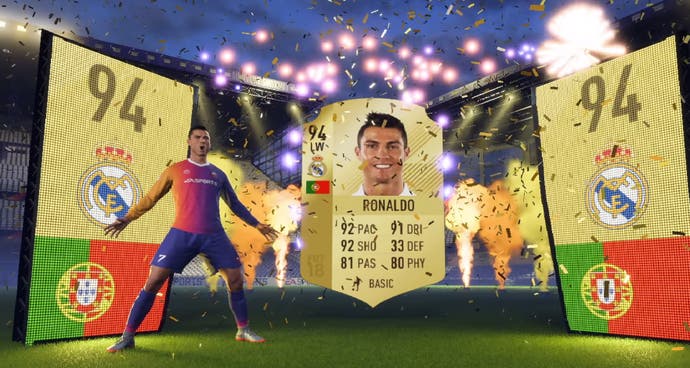DCMS Committee recommends UK Government regulates loot boxes under the Gambling Act
And ban the sale of loot boxes in games aimed at children.
The Department for Digital, Culture, Media & Sport Committee has recommended the Government regulates loot boxes under the Gambling Act.
It also recommends the Government order publishers to strip loot boxes out of games aimed at children, and tell PEGI to slap games with loot boxes with an appropriate age rating.
In a stark report following the Committee's inquiry into the growth of "immersive and addictive technologies", the DCMS issued a raft of recommendations for Government, which marks a step-change in the thinking around loot boxes in the UK.
While the DCMS Committee's recommendations are not law, industry members have told Eurogamer they will be taken seriously, and pointed to Labour deputy leader Tom Watson as a prominent politician who has a keen interest in loot boxes and other publisher practices.
Digging into the detail, the Committee said the Government should bring forward regulations under section six of the Gambling Act 2005 in the next parliamentary session to specify loot boxes are a game of chance.
According to the Committee, if Government determines not to regulate loot boxes under the Act at this time, the Government should produce a paper clearly stating the reasons why it does not consider loot boxes paid for with real-world currency to be a game of chance played for money's worth.(Previously, the Gambling Commission said current laws don't see loot boxes as gambling, largely because there's no real-world cash value to the items received in a loot box.)
Elsewhere, the Committee recommends the Government should advise PEGI, the European video game age ratings organisation, to apply the existing 'gambling' content labelling, and corresponding age limits, to games containing loot boxes that can be purchased for real world money and do not reveal their contents before purchase. (The current PEGI descriptor for in-game purchases does not specifically differentiate between loot boxes and other items.)
Crucially, the Committee said in the absence of research which proves no harm is being done by exposing children to gambling through the purchasing of loot boxes, a precautionary principle should apply and they are not permitted in games played by children until the evidence proves otherwise.
This brings into question the future of loot boxes in games such as FIFA, which is played by millions of children in the UK and makes billions from the sale of a virtual currency which can be used to buy packs of Ultimate Team cards.

The Committee said the DCMS should immediately update its areas of research interest to include gaming disorder, and games companies should be required to share aggregated player data with researchers and contribute financially to independent research through a levy administered by an impartial body.
Addressing a loophole in the rating of PC games sold on digital platforms such as Steam, the Committee recommended the Video Recordings Act should be amended to ensure online games are covered by the same enforceable age restrictions as games sold on discs.
The Committee's recommendations come following a number of PR disasters for the video game industry in relation to loot boxes and their link to gambling.
Back in June, representatives from EA and Epic were sent to answer questions from MPs on the difficult issues with video games, and it did not go well. At the meeting, the rep from EA stepped in to say "we don't call them loot boxes - we call them surprise mechanics" - a turn of phrase that turned out to be a lightning rod for renewed discussion around the business practices of the publisher.
"We do think the way we've implemented these kinds of mechanics is quite ethical and quite fun," Kerry Hopkins, vice president, legal and government affairs at Electronic Arts said. "They aren't gambling and we disagree that there's evidence that shows they lead to gambling."
Tonight's report suggests the Committee was not convinced.
What happens next? Dr Jo Twist, CEO of UK Interactive Entertainment, issued the following statement in response to the report's findings:
"The video games industry has always, and will continue to, put the welfare of players at the heart of what we do. We will review these recommendations with utmost seriousness and consult with the industry on how we demonstrate further our commitment to player safety - especially concerning minors and vulnerable people.
"It is important that we keep engaging constructively with a range of stakeholders, including MPs, regulators and law enforcement agencies because we support an evidence-based approach to modern policy making. We have consistently been in dialogue with government and other key partners about establishing an appropriate research framework and will continue to do so.
"We are pleased the Committee acknowledges that the majority of people play video games in a positive, safe and responsible way. The industry does not dispute that, for a minority, finding balance is a problem. This is why we are vocal in supporting efforts to increase digital literacy and work with schools and carers on education programmes.
"We also welcome the Committee's recognition of good practice, which already exists in the industry, including pioneering community management and technical measures which ensure players have a safe experience online.
"The discussion around age ratings is actively ongoing and the system is continually reviewed. Changes have already been made including the introduction of an in-game purchase description label and as technology evolves so will the robust process by which it is reviewed and rated."

















